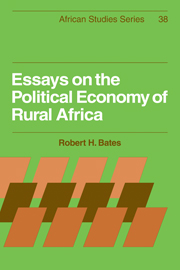Book contents
- Frontmatter
- Contents
- Dedication
- Acknowledgements
- Introduction
- Part I The pre-colonial period
- Part II The colonial period
- 3 Pressure groups, public policy, and agricultural development: a study of divergent outcomes
- 4 The commercialization of agriculture and the rise of rural political protest
- Part III Agrarian society in post-independence Africa
- Conclusion
- Notes
- Index
4 - The commercialization of agriculture and the rise of rural political protest
Published online by Cambridge University Press: 26 January 2010
- Frontmatter
- Contents
- Dedication
- Acknowledgements
- Introduction
- Part I The pre-colonial period
- Part II The colonial period
- 3 Pressure groups, public policy, and agricultural development: a study of divergent outcomes
- 4 The commercialization of agriculture and the rise of rural political protest
- Part III Agrarian society in post-independence Africa
- Conclusion
- Notes
- Index
Summary
This chapter explores the relationship between the commercialization of agriculture and the rise of rural political protest in the colonial period in Africa. It does so by examining several of the major issues which arose in the countryside during the colonial period in Africa. These issues include protests over governmental regulation of agricultural production, protests concerning the structure of markets, conflicts over land tenure, and disputes over taxes. Taken together, confrontations over these issues made up much of the rural political agenda in Africa during the colonial period.
Some of these issues were more significant in some places than in others. Disputes over the structure of markets most frequently arose in the forest areas of West Africa and in the cotton-producing regions about Lake Victoria, whereas conflicts over land-use regulations most frequently arose in the savannah farmlands of East Africa. The relative significance of the issues varied over time as well. Disputes over land tenure were most important at the onset of the large-scale commercialization of agriculture, that is, in the late nineteenth and early twentieth centuries; while the conservation issue rose to prominence after the intensification of agricultural production had begun to make a major impact on the environment and ecology of the farming areas – in the 1930s and 1940s.
The importance of these issues thus varied over space and time. But, over the continent as a whole and over the colonial period in its entirety, these issues accounted for a large portion of the political grievances of the African countryside.
- Type
- Chapter
- Information
- Essays on the Political Economy of Rural Africa , pp. 92 - 104Publisher: Cambridge University PressPrint publication year: 1983

